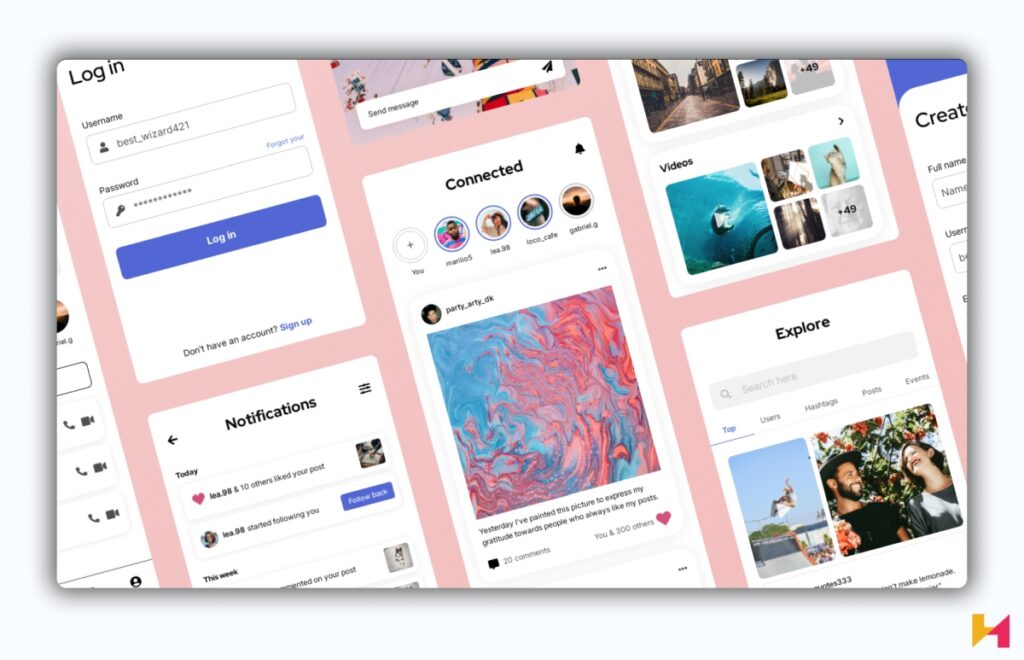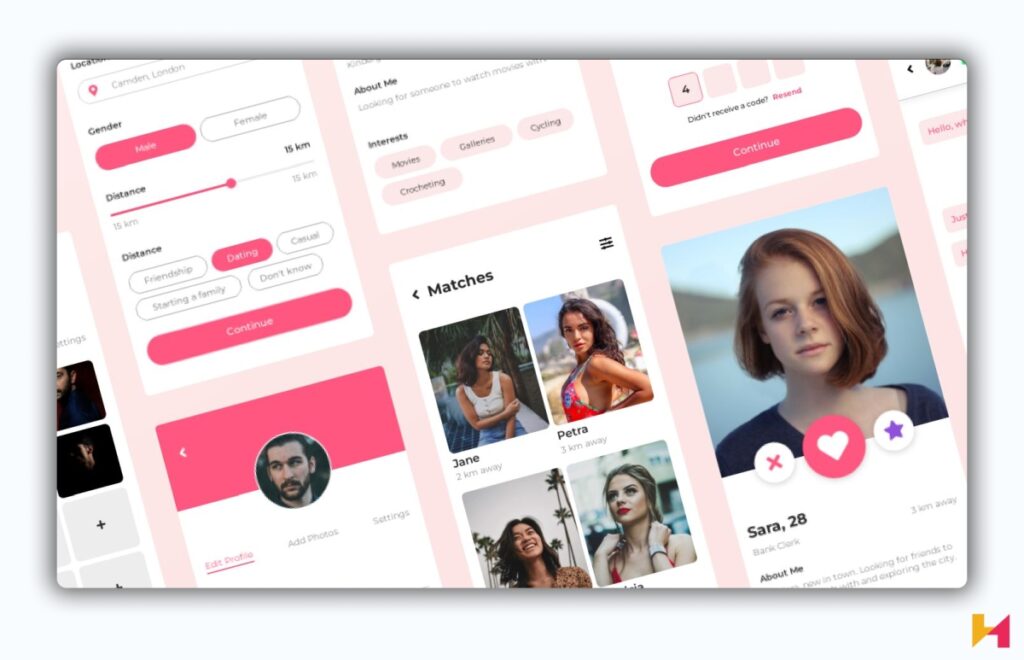Travel App Development: Everything You Need to Know as a Startup Founder
Investing in travel app development is not just about keeping up with current trends, but positioning your startup around the myriad...

This robust growth can be attributed to factors such as the increasing adoption of smartphones, advances in mobile technology, and the expanding range of available applications.
For a startup founder, these statistics offer a clear message: integrating a well-designed, user-friendly mobile app into your business strategy is crucial for staying competitive and relevant in today’s market.
After you’ve decided to build an app, the follow-up question you’ll likely ask is, “How much is this going to cost me?” The answer isn’t straightforward.
The following article aims to shed light on the considerations and factors that influence the cost of mobile app development and the importance of choosing a partner who can deliver future-proof quality and scalability. By the end of it, we hope you get an inch closer to creating an innovative, user-centric app that captures a share of the market.
In this article:
The cost of mobile app development varies significantly based on several factors, including app complexity, features, and platform (iOS, Android, or hybrid). It’s also important to consider ongoing costs like maintenance, updates, and potential scaling post-launch. Then, there’s also the human factor – the development team’s expertise and geographic location play a big role in mobile app development cost.
In general, mobile app development costs can range from as low as $5,000 for basic apps in lower-cost regions like India to well over $250,000 for sophisticated, feature-rich apps developed in the US or Western Europe.
The breadth of this range underscores the importance of having a clear understanding of these costs, as it’s essential for efficient budgeting, setting timelines, and even investor relations. In the following sections, we will provide you with a comprehensive understanding of all the factors to help you navigate mobile app development with confidence.
Over the years, we’ve learned that it’s imperative that clients have a full understanding of development costs. Founders often come to us with misconceptions, underestimating the resources needed for their ambitious visions or overlooking post-launch expenses like maintenance and updates. Ultimately, it’s our responsibility to guide them through a realistic cost framework and ensure they are fully informed to make decisions that align with both their innovative aspirations and practical budget constraints. CEO, ASPER BROTHERS Let's Talk
The mobile app development cost can vary dramatically based on the type of app you’re developing. From social media to e-commerce, each app category comes with its unique set of features, design requirements, and technical complexities, all of which influence the final development cost.
In this section, we’ll dive into the typical cost ranges for different app types, including social media, dating, gaming, e-commerce, and food delivery apps. We’ll explore the factors affecting these costs to give you a clearer picture of what you pay for.

Source: uizard.io
As a startup founder venturing into social media app development, you’re probably wondering about the costs involved. The development process for a social media app involves several stages, including ideation, design, development, testing, and deployment. The costs are influenced by the app’s features, design complexity, and the technology used.
The development of a social media app starts with planning the features and user interface. This is followed by coding, testing for functionality and bugs, and finally, deployment. Continuous updates and maintenance are also part of the process.
The cost to build a social media app can vary widely, typically ranging from $30,000 to $250,000. In some cases, it can even reach over one million dollars. The wide range depends on factors like feature complexity, design quality, and the chosen tech stack.
Given this broad spectrum, the timeframe for developing a social media app can also vary significantly, from a few months to over a year, depending on the project’s complexity and scope.

Source: uizard.io
If you’re considering developing a dating app, understanding the associated costs is crucial. Like social media apps, the cost of developing a dating app depends on its complexity, features, design, and technology stack.
The process involves designing an engaging and intuitive user interface, developing features like swiping, matching algorithms, and chat functionalities, and ensuring robust security measures.
The development cost for a basic dating app starts around $20,000, but can rapidly increase to $125,000 or more for apps with more complex functionalities. Advanced features and dual-platform development (iOS and Android) can push costs upwards of $150,000.
The timeframe for developing a dating app can range from several months to over a year, depending on the app’s complexity and the features included.

Source: unblast.com
Developing a game app can be an exciting yet challenging venture. The cost is influenced by the game’s genre, complexity, graphics, and platforms (iOS, Android, or both).
Game app development involves game design, character development, coding, and rigorous testing for a seamless user experience.
The development cost can range from as low as $3,000 for basic indie games to $500,000 for more sophisticated mobile games. A minimal viable product (MVP) could cost around $20,000, but this increases with added features and complexity.
The timeframe for game app development varies greatly depending on the game’s complexity and the resources available. It can range from a few months to several years.

Source: uizard.io
In the booming world of e-commerce, developing an app requires careful consideration of features, user experience, and data security. The cost varies depending on the app’s complexity and intended functionality.
The process involves creating a user-friendly interface, integrating payment gateways, ensuring robust security, and optimizing for different devices.
A basic e-commerce app development can start from as low as $7,500, with costs potentially rising to $30,000 or more for apps with extensive features. More sophisticated apps can exceed $200,000.
The development timeframe for an e-commerce app depends on its complexity and can range from a few months to over a year.

Source: uizard.io
The food delivery app market is highly competitive, and the development cost can vary based on the app’s features and functionality.
The process includes designing an intuitive interface, integrating with restaurants, and ensuring efficient order processing and delivery tracking.
Basic food delivery apps can cost around $12,000 to $25,000, but more sophisticated apps can range between $30,000 to $40,000. For highly advanced apps like Uber Eats or GrubHub, costs can start at $5,000 and escalate to $150,000 or more.
The development of a food delivery app can take several months to over a year, depending on the complexity and scope of the project.
Developing a mobile app can be an intricate and costly endeavor. Several factors significantly influence the overall cost of mobile app development. Understanding these can help you better plan and budget for your startup’s app development process.
Selecting the platform for your mobile app directly impacts development costs. Each platform comes with its own set of complexities, audience reach, and cost implications. Understanding these nuances will help you align this decision with your goals.
The app’s category (e.g., gaming, business, education) significantly influences its development cost. Complex categories like games often require more sophisticated graphics and functionalities, thereby increasing the cost.
The design is a crucial factor as it’s the first element that interacts with the user. The cost of design will depend on the app’s complexity, the experience of the designer, and the specific design requirements for different platforms.
The number and complexity of features significantly impact development costs. Basic features like user log-in, push notifications, and navigation are essential, but remember that the cost increases as you add more complex features like geolocation, in-app purchases, and payment integration.
Post-launch, apps require regular updates and bug fixes. This ongoing maintenance is an additional cost that includes upgrading the app’s functionalities and features.
Using existing code can reduce development time and cost. However, it depends on the app’s requirements and whether the available code meets the app’s needs.
Based on complexity, apps can be categorized as small, medium, or large. Small apps with limited functionality are the cheapest to develop, while large apps with advanced features like multi-language support and third-party integrations are the most expensive.
The longer the development timeline, the higher the cost. This is due to the extended need for resources like developers, designers, and testers.
The team’s size and location significantly impact the development cost. Large companies with specialized departments generally cost more than smaller teams or independent developers. Additionally, the cost varies based on the team’s geographical location, with developers in some regions charging higher rates than others.
Selecting the right app development company is a crucial step for the success of your startup’s mobile app. Here are key considerations to guide you in making an informed decision:
Before approaching app development companies, have a clear understanding of your app’s requirements. This includes the app’s purpose, target audience, desired features, and technical specifications. This clarity will help in effectively communicating your vision and expectations to potential developers.
Opt for companies that offer a full spectrum of app development services. This includes not just coding, but also market research, prototyping, UI/UX design, MVP development, API integration, testing, and post-launch maintenance. Full-service companies provide a more integrated approach, ensuring consistency and efficiency throughout the development process.
It’s vital to know the team that will work on your project. Interview the developers to understand their expertise, experience, and approach to work. This helps in building a rapport and ensures that the team aligns with your project’s needs and company culture.
Choose a company that specializes in mobile app development, ensuring they have the skills and knowledge necessary to deliver a quality product. Assess the technical stack and tools the company uses, as their expertise in modern and efficient technologies is crucial for developing an app that is robust and scalable. Moreover, an experienced team can provide you with advice and insight that are extra valuable.
Examine the company’s previous work to gauge their expertise and experience in your specific industry, as they will better understand your business needs and target audience. Also, look for projects similar to yours in terms of complexity. This will give you an insight into their capability to handle yours.
Evaluate the tools and processes the company uses for communication and collaboration. This is crucial for maintaining transparency and ensuring smooth workflow throughout the development process. Also, inquire about the company’s project management tools and methodologies. This will give you insight into how they plan, execute, and manage app development projects.
See how the company plans to integrate analytics and user feedback mechanisms. This integration is key to understanding user behavior, improving app performance, and ensuring that the app evolves according to user needs.
Opt for a Time and Materials contract, as it offers a flexible, agile-friendly, and transparent framework for app development. Its adaptability to changing requirements, focus on long-term value, enhanced communication, and transparent project management make it the most practical choice. Also, understand the company’s approach to post-launch support and how they handle app scalability. This is important for future updates and expansion of your app. Be open about your long-term plans and expectations with the potential vendor. This transparency helps the development company to align its strategies accordingly.
Emerging technologies and changing user preferences will continue to shape the mobile landscape. Staying adaptable and informed will be key to any startup founder. The future promises advancements in areas like AI, AR/VR, and blockchain, which might not only transform app functionalities but also influence mobile app development costs and processes.
Remember, the investment in a mobile app is not just financial; it’s also an investment in the future of your business, keeping you at the forefront of digital innovation. Stay curious, stay informed, and let your app be a gateway to new opportunities and growth.
Investing in travel app development is not just about keeping up with current trends, but positioning your startup around the myriad...
When you think about modern convenience, delivery apps likely come to mind. They've become an integral part of our lives...
Welcome to our insightful exploration into the art of hiring developers for your startup. This article is your guide through the...